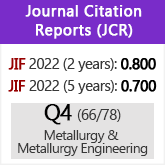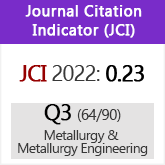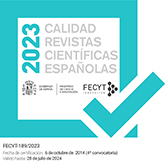Internal stresses analysis in electroformed nikel shells for thermoplastics inyection mold core (rapid tooling)
DOI:
https://doi.org/10.3989/revmetalm.2005.v41.i1.186Keywords:
electroforming, internal stresses, rapid tooling, cores, electrodeposition.Abstract
This study deals with a research field started at the LFI (Laboratorio de Fabricación Integrada) of the ULPGC (Universidad de Las Palmas de Gran Canaria). Its aim is to analyse and propose improvements in the electroformed nickel cores manufacture. The main application of these cores is to be used as plastic injection molds. It has been considered an important part of this study taking under consideration internal stresses that appear in the nickel electroformed core. These stresses play a determinant role towards reaching a dimensional and resistant quality standard of the shells, which will be later transformed into cores. The investigation includes not only a theoretic study but also an experimental one. The testing method has the remarkable advantage of a wide industrial application because of its simplicity, low cost and reproducibility of the electrolytic bath actual conditions.
Downloads
Download data is not yet available.
Downloads
Published
2005-02-28
How to Cite
Monzón, M. D., Marrero, M. D., Benítez, A. N., & Fernández, P. M. (2005). Internal stresses analysis in electroformed nikel shells for thermoplastics inyection mold core (rapid tooling). Revista De Metalurgia, 41(1), 53–59. https://doi.org/10.3989/revmetalm.2005.v41.i1.186
Issue
Section
Technical Notes
License
Copyright (c) 2005 Consejo Superior de Investigaciones Científicas (CSIC)

This work is licensed under a Creative Commons Attribution 4.0 International License.
© CSIC. Manuscripts published in both the printed and online versions of this Journal are the property of Consejo Superior de Investigaciones Científicas, and quoting this source is a requirement for any partial or full reproduction.All contents of this electronic edition, except where otherwise noted, are distributed under a “Creative Commons Attribution 4.0 International” (CC BY 4.0) License. You may read here the basic information and the legal text of the license. The indication of the CC BY 4.0 License must be expressly stated in this way when necessary.
Self-archiving in repositories, personal webpages or similar, of any version other than the published by the Editor, is not allowed.

















